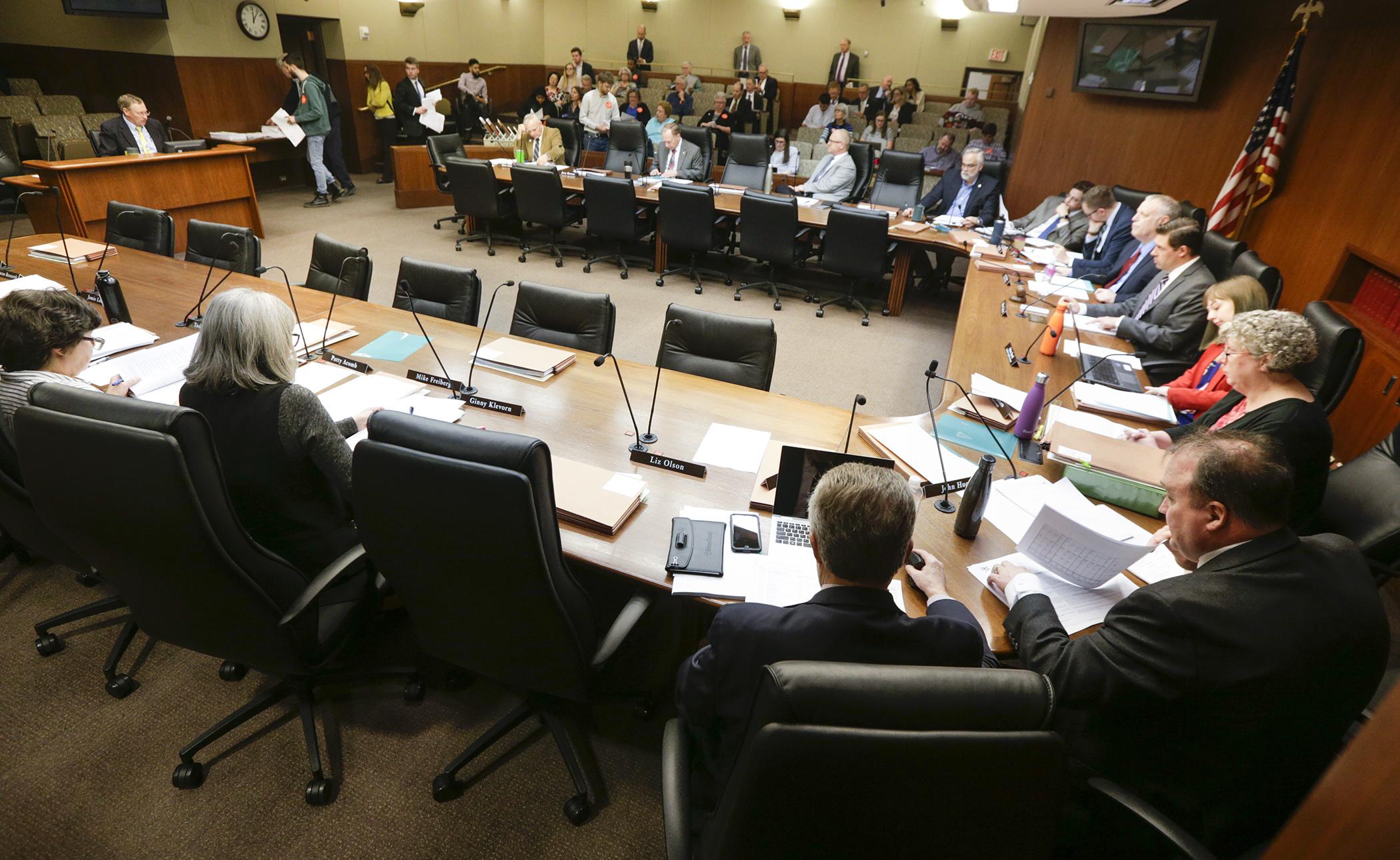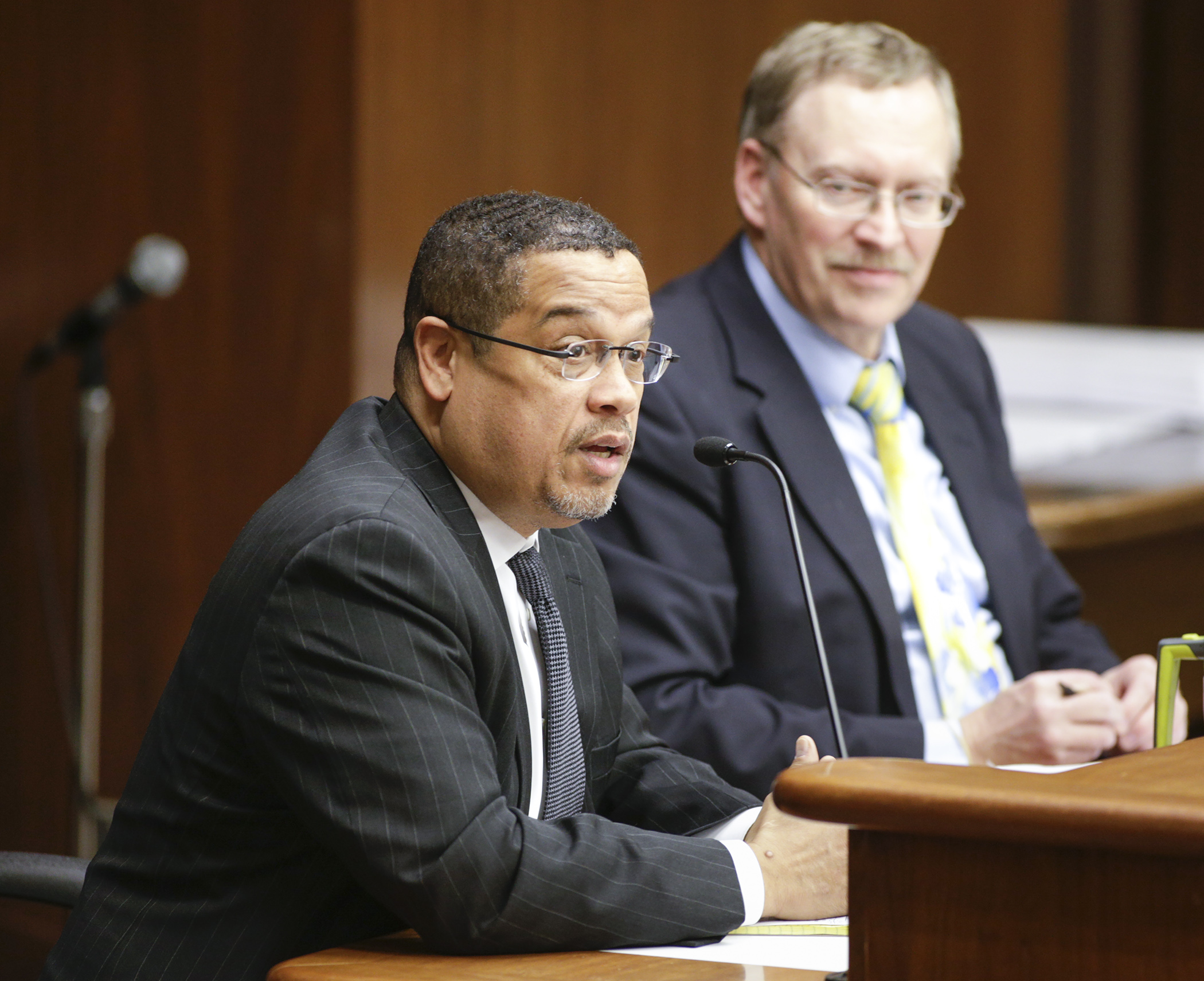State government finance bill: nearly billion dollars in spending, many elections changes

Given a budget target of almost $987.39 million in General Fund spending, the omnibus state government finance bill would spend every last dollar.
Rep. Michael Nelson (DFL-Brooklyn Park) sponsors HF1935 as amended with a delete-all and a sponsor amendment. It calls for a nearly $102.53 million increase over base; $13 million more than the budget proposed by Gov. Tim Walz.
The House State Government Finance Division, which Nelson chairs, received a bill walkthrough and heard from representatives of some affected parties Monday. Public testimony is scheduled to continue at 8 a.m. Tuesday before the division reconvenes at 3 p.m. to consider amendments and vote on the bill.
Sen. Mary Kiffmeyer (R-Big Lake) sponsors the Senate omnibus budget bill. SF2227 is scheduled to be acted on Tuesday by the Senate State Government Finance and Policy and Elections Committee.
Finances
Among its increase. the House bill calls for a $24.1 million increase for MN.IT services, a 449.8 percent base increase, yet $500,000 less than the governor’s request. Enhancements to cybersecurity across state government would be funded with $20 million of the total. The remainder is “to expand the state information technology project portfolio and project management oversight across state government.”
Other changes include an additional $8.92 million for Minnesota Management and Budget (17.2 percent increase), of which $5.5 million would be for system security and risk management and nearly $2.04 million is “to support enhanced sexual harassment prevention activities, to support the Office of Inclusion and Equity, to fund state workforce recruitment activities, and to implement a statewide compensation study.”
The Department of Administration would receive an additional $5.3 million (a 10.9 percent bump), including $1.6 million for Minnesota Census 2020 mobilization, and an extra $700,000 would go to for the governor’s office (9.7 percent increase) to create an Office of Public Engagement.
The state’s four ethnic councils — Minnesotans of African Heritage, Latino Affairs, Asian Pacific Minnesotans and Indian Affairs — would receive an additional $2.27 million combined, with increases ranging from 31.7 to 89.8 percent.
[MORE – View the spreadsheet]
The House budget would increase by $11.5 million in the biennium, or 17.8 percent. That is due primarily to an increase in member salaries established by the Legislative Salary Council. It recently raised legislator salaries to $46,500 effective July 1, 2019. Members earned $31,140 until the council raised that to $45,000 in 2017.
Elections
With an aim of making state elections safer and more accessible to all Minnesotans, much of the omnibus elections bill has been rolled into the omnibus state government finance bill. Ensuring a complete and accurate U.S. Census count is also a goal.
 Attorney General Keith Ellison testifies April 8 before the House State Government Finance Division on HF1935, the division’s omnibus bill sponsored by Rep. Michael Nelson, right. Photo by Paul Battaglia
Attorney General Keith Ellison testifies April 8 before the House State Government Finance Division on HF1935, the division’s omnibus bill sponsored by Rep. Michael Nelson, right. Photo by Paul Battaglia“Civic engagement is not a spectator sport in Minnesota,” Nelson said in a statement upon release of the omnibus package. “We consistently lead the nation in voter participation and stand on a strong history of ensuring every Minnesotan is included and counted in our society. Our proposal reflects a continued commitment to upholding those fundamental values.”
Among the nearly two-dozen proposed changes would be the restoration of voting rights to people who have been convicted of a felony once they complete their incarceration. Currently, those rights are not restored until all of a sentence, including probation, is concluded.
According to the National Conference on State Legislatures, felons receive the OK to vote upon release from prison in 14 states and the District of Columbia.
Also included would be a way for Minnesotans to be automatically registered to vote when applying for a Minnesota driver’s license, state identification card, or learner’s permit. The secretary of state’s office would still review an application to ensure someone is eligible to cast a ballot.
Other proposed changes would:
- appropriate $6 million in federal Help America Vote Act grant funding for election system security improvements, a provision in HF14 that is now stuck in conference committee;
- provide free public transportation on Election Day;
- provide grants to local governments and nonpartisan, nonprofit organizations engaged in census mobilization, and authorize U.S. Census workers to access multi-unit housing facilities;
- allow early voting in all federal, state and county elections from 30 days prior through the third day before the election;
- restrict access to a voter’s political party choice at the presidential nomination primary to only the party designated by the voter;
- permit all local governments to use ranked-choice voting for local officials;
- authorize the option of mail balloting for all towns, and all cities with fewer than 400 registered voters;
- eliminate the existing three-person cap on the number of voters a person may provide assistance to in a polling place;
- establish a Redistricting Advisory Commission to draw and recommend new congressional and legislative district boundaries after each census; and
- allow members appointed to a school board to fill a vacancy to serve the remainder of the unexpired term. Existing law requiring a special election in most circumstances would be eliminated.
State government operations
The bill proposes to make changes in the way state government operates in myriad areas including commission extensions, honorary flags, hair braiding, horse racing, ice arenas, legislative and local government accessibility and retirement funding.
Included changes would:
- eliminate the Legislative Budget Office, which was established in 2017;
- require the Legislature to comply with information technology accessibility standards adopted by Minnesota IT Services, and establish a legislative employee working group to assist the Legislature in identifying accessibility needs related to its IT services;
- establish a program and advisory council to award grants to local governments to improve website accessibility;
- extend the Legislative Water Commission to July 1, 2025 and the Legislative Commission on Data Practices and Personal Data Privacy to June 30, 2026;
- establish a program to provide a U.S. and Minnesota state flag flown over the State Capitol to families of public safety officers killed in the line of duty, and families of members of the military who died while in active service;
- increase the maximum grant that may be provided under the Mighty Ducks grant program for projects that eliminate the use of R-22 refrigerant in state public ice facilities;
- provide state employee salary and benefits be provided in the event of a state government shutdown, with payment made upon the employee’s return to work;
- require a reduction in professional and technical services contracts across all state agencies by at least $890,000 in the 2020-21 biennium;
- allow small businesses to be certified by a nationally recognized certifying organization in order to participate in the state’s small business and small targeted group business programs;
- require a replacement plaque on the Capitol grounds to recognize Minnesotans who served at home and abroad in World War I;
- exempt hair braiders from registration and other oversight by the Board of Cosmetologist Examiners; and
- increase state payment to the Minneapolis Employees Retirement Fund to $16 million. Current law requires a $6 million contribution to the fund in 2019 and thereafter.
What’s in the bill?
The following are selected bills that have been incorporated in part or in whole into the omnibus state government finance bill:
- HF14 (Nelson)
- HF40 (Dehn)
- HF94 (Vang)
- HF123 (Nelson)
- HF140 (Moran)
- HF489 (Dehn)
- HF673 (Lucero)
- HF839 (Huot)
- HF956 (Koegel)
- HF1152 (Freiberg)
- HF1153 (Halverson)
- HF1371 (Long)
- HF1603 (Dehn)
- HF1605 (Klevorn)
- HF1740 (Huot)
- HF1863 (Lillie)
- HF2050 (Bahner)
- HF2512 (Long)
- HF2768 (Nelson)
Related Articles
Search Session Daily
Advanced Search OptionsPriority Dailies
Ways and Means Committee OKs proposed $512 million supplemental budget on party-line vote
By Mike Cook Meeting more needs or fiscal irresponsibility is one way to sum up the differences among the two parties on a supplemental spending package a year after a $72 billion state budg...
Meeting more needs or fiscal irresponsibility is one way to sum up the differences among the two parties on a supplemental spending package a year after a $72 billion state budg...
Minnesota’s projected budget surplus balloons to $3.7 billion, but fiscal pressure still looms
By Rob Hubbard Just as Minnesota has experienced a warmer winter than usual, so has the state’s budget outlook warmed over the past few months.
On Thursday, Minnesota Management and Budget...
Just as Minnesota has experienced a warmer winter than usual, so has the state’s budget outlook warmed over the past few months.
On Thursday, Minnesota Management and Budget...